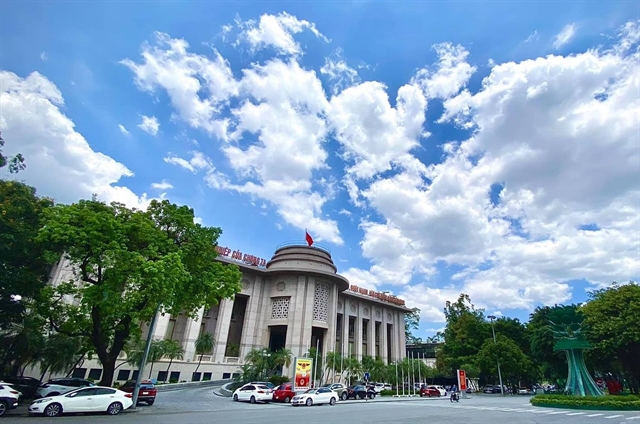SBV rolls out measures to reign in raising USD-VNĐ exchange rate
According to an SBV report, the exchange rate for the greenback broke the VNĐ24,000 mark on September 11 and reached its highest level at VNĐ24,076 on Monday.
 |
|
State Bank of Vietnam headquarters in Hà Nội. VNA/.VNS Photo |
HÀ NỘI - Measures have been taken by the State Bank of Vietnam to reign in the rising US dollars against the VNĐ.
According to an SBV report, the exchange rate for the greenback broke the VNĐ24,000 mark on September 11 and reached its highest level at VNĐ24,076 on Monday.
On the black market, the USD exchange rate on Monday was trading at around VNĐ24,320 - 24,400, an increase of about 170 VNĐ compared to the previous week.
Commercial banks reported a USD exchange rate of VNĐ24,500-24,600 earlier this month, a 3.3 per cent increase year-to-year compared to the same period last year.
The VNĐ is facing significant pressure as the DXY index (a measure of the strength of the US dollar against a basket of six major currencies) has risen for the 10th consecutive week, marking the longest upward trend in recent years.
Economists and experts said actions taken by the US Federal Reserve (Fed) including raising interest rates and US government bond yields are contributing factors to a rising DXY index, which has reached 106 points, the highest level in the last six months.
MB Securities (MBS) said in a report if the Fed was to continue raising interest rates by another 0.25 percentage points in November, the exchange rate could reach as high as VNĐ24,300 - 24,500 in the final months of 2023.
In addition, SBV's recent loosening of monetary policy, in contrast to the tightening in the US, has put extra pressure on the US-VNĐ exchange rate. This is, however, not unique to Việt Nam as China and Japan, two major Asian economies, have also been loosening their purse strings.
In contrast to the Fed's recent interest hikes, the SBV has slashed interest rates four times since May last year.
However, experts said the SBV had ample time to prepare before making its moves and the risk was considerably lower this year. Factors that support the central bank's moves included Việt Nam's high trade surplus, inflow of FDI and remittances, which all contribute to the country's foreign currency supply.
Trần Ngọc Báu, CEO of WiGroup, a financial market research company, said the rise of the greenback was within the SBV's anticipation, and that the possibility of a sharp increase at the end of 2023 remained minimal.
Dr Cấn Văn Lực, a member of the National Advisory Council for Monetary Policies said even if another round of interest increase was to take place in November, as announced by the Fed, fluctuation would likely be insignificant as the market would have had enough time to prepare.
However, a rising exchange rate will still produce negative effects including higher costs for production and imported consumer goods, especially for private businesses.
Nguyễn Việt Hùng, a financial officer at the Đông Anh Mechanical Corporation said a fluctuating exchange rate would likely hurt import-independent businesses.
Textile, leather, footwear and fruit businesses have been struggling with fluctuating exchange rates since the beginning of the year as the higher exchange rate has pushed up costs for importing machinery, equipment, and raw materials, significantly reducing the profits.
Governor of the State Bank of Vietnam Nguyễn Thi Hồng, said maintaining the US-VNĐ exchange rate would likely remain a challenging task.
She said it was important to look at the bigger picture while managing the exchange rate.
"A higher exchange rate benefits export-oriented businesses, but domestic production relies heavily on imports, with the import/GDP ratio close to 100 per cent. So, when the exchange rate rises, importing businesses face difficulties," she said.
Her deputy Đào Minh Tú said the central bank must find a balance between interest rates and exchange rates.
The Southeast Asian economy's trade surplus, estimated at US$20.1 billion in the first eight months of the year, as well as a record 24 per cent increase in FDI inflow are to serve as much-needed buffers for the remaining months of 2023.
The SBV has also been making its own moves to address the rising exchange rate including the recent issuance of treasury bills, which has net absorbed nearly VNĐ30 trillion from the banking system.
Economist Đinh Trọng Thịnh said SBV's key objective is to absorb excess money from the market, which has been produced by the government's economic stimuli including increasing public spending and slashing VAT and interest rates post-COVID-19.








